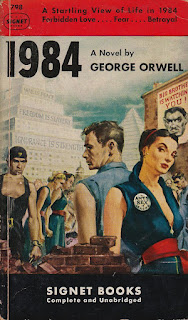"1984" is a dystopian novel written by George Orwell and published in 1949. The novel is set in a totalitarian society in the year 1984, where the government, known as the Party, controls every aspect of citizens' lives. The novel deals with themes of government surveillance, censorship, and the loss of individual freedom.
The story follows Winston Smith, a low-ranking member of the ruling Party who becomes disillusioned with the regime's oppressive policies. Winston begins to secretly rebel against the Party's control and starts a forbidden love affair with a fellow Party member named Julia. As Winston becomes more involved in the resistance, he comes to the attention of the Party's inner circle, leading to a harrowing finale.
One of the most striking aspects of "1984" is its depiction of the Party's control over citizens' thoughts and actions. The Party uses a system of propaganda and censorship to manipulate the truth and control the narrative. The Party's slogan, "War is Peace, Freedom is Slavery, Ignorance is Strength," is a chilling example of the Party's manipulation of language to control the thoughts of citizens.
The Party's use of technology to monitor citizens is another powerful symbol of the loss of privacy and individual autonomy. The Party employs a vast network of telescreens that allow them to monitor citizens' every move and listen in on their conversations. The Thought Police, a secret police force that monitors citizens' thoughts and behaviors, are another frightening example of the Party's control over citizens.
In addition to the Party's control over citizens' thoughts and actions, "1984" also explores the themes of the loss of individual freedom and the dangers of conformity. The Party controls every aspect of citizens' lives, from their work to their leisure time. Citizens are required to participate in daily exercises known as the Two Minutes Hate, where they express their hatred for the Party's enemies. The Party's use of Newspeak, a language designed to limit free thought and expression, is another powerful symbol of the dangers of conformity.
The character of Winston Smith is a powerful symbol of resistance against the Party's control. Winston's rebellion against the Party's policies is a reminder of the importance of individual freedom and the power of resistance against oppression. Winston's fate is a powerful warning against the dangers of totalitarianism and the need to fight for freedom and democracy.
"1984" is widely regarded as a masterpiece of dystopian literature. The novel has been adapted into multiple films, plays, and other media and has become a cultural touchstone for discussions of government surveillance and the dangers of authoritarianism.
The novel's relevance to modern-day issues is undeniable. The themes of government surveillance, censorship, and the loss of individual freedom are still prevalent in society today. The novel is a powerful reminder of the importance of freedom and democracy and the need to remain vigilant against the dangers of totalitarianism.
In conclusion, "1984" by George Orwell is a powerful and thought-provoking novel that has become a classic of dystopian literature. The novel's depiction of government surveillance, censorship, and the loss of individual freedom is as relevant today as it was when the novel was first published. The character of Winston Smith is a powerful symbol of resistance against oppression, and the novel is a reminder of the importance of fighting for freedom and democracy. "1984" is a must-read for anyone interested in dystopian literature or concerned about the dangers of authoritarianism.











No comments:
Post a Comment